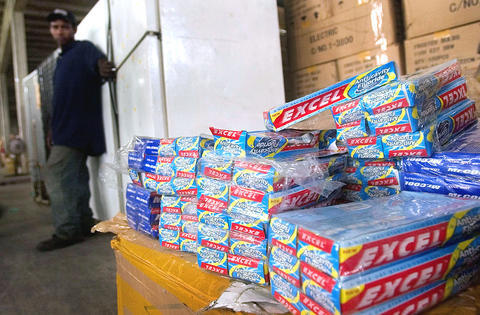Tubes of toothpaste sold in discount stores in four US states and labeled Colgate -- and described as counterfeit by Colgate -- are being recalled because they may contain a poisonous chemical, the importer of the tubes said.
A Food and Drug Administration official, Doug Arbesfeld, confirmed on Wednesday that testing had found the chemical in a product with the Colgate label. But he said the agency is unsure if it is really Colgate or a counterfeit.
"We are aware that toothpaste is something that's been counterfeited in the past," he said. "We don't want to alarm people unnecessarily."

PHOTO: AP
MS USA Trading, Inc of North Bergen, New Jersey, said the toothpaste may contain diethylene glycol, a chemical found in antifreeze.
The company said the toothpaste, imported from South Africa, was sold in discount stores in New Jersey, New York, Pennsylvania and Maryland.
"Made in South Africa" is printed on the box and the batch includes Regular, Gel, Triple and Herbal versions.
The trading company said the problem was discovered in routine testing by the Food and Drug Administration. It said no illnesses have been reported to date.
The same chemical has led to the recall of several brands of toothpaste imported from China in recent weeks.
Colgate-Palmolive issued a statement yesterday saying the tubes are counterfeit.
The company said it does not use, nor has ever used, diethylene glycol as an ingredient in Colgate toothpaste anywhere in the world.
"Colgate does not import toothpaste into the US from South Africa," said the statement.
Meanwhile, New Zealand health officials warned consumers yesterday not to use toothpastes imported from China because they may contain toxins, the latest country to issue a warning over the products.
Health Ministry spokesman Mike Flyger said one of the imported toothpaste brands available in shops, Excel, contained diethylene glycol, and there may be other brands also containing the toxic chemical.
The importation of the toothpaste was illegal as it had not been approved by the government's product safety agency, Medsafe, and contained ingredients that may be harmful, Flyger said.
Director General of Health Stephen McKernan said the Excel brand was being sold in the South Island's Just $2 chain of stores. Just $2 managing director David Ellis said 6,000 tubes of the toothpaste had been sold over the past two years.

A magnitude 7.0 earthquake struck off Yilan at 11:05pm yesterday, the Central Weather Administration (CWA) said. The epicenter was located at sea, about 32.3km east of Yilan County Hall, at a depth of 72.8km, CWA data showed There were no immediate reports of damage. The intensity of the quake, which gauges the actual effect of a seismic event, measured 4 in Yilan County area on Taiwan’s seven-tier intensity scale, the data showed. It measured 4 in other parts of eastern, northern and central Taiwan as well as Tainan, and 3 in Kaohsiung and Pingtung County, and 2 in Lienchiang and Penghu counties and 1

FOREIGN INTERFERENCE: Beijing would likely intensify public opinion warfare in next year’s local elections to prevent Lai from getting re-elected, the ‘Yomiuri Shimbun’ said Internal documents from a Chinese artificial intelligence (AI) company indicated that China has been using the technology to intervene in foreign elections, including propaganda targeting Taiwan’s local elections next year and presidential elections in 2028, a Japanese newspaper reported yesterday. The Institute of National Security of Vanderbilt University obtained nearly 400 pages of documents from GoLaxy, a company with ties to the Chinese government, and found evidence that it had apparently deployed sophisticated, AI-driven propaganda campaigns in Hong Kong and Taiwan to shape public opinion, the Yomiuri Shimbun reported. GoLaxy provides insights, situation analysis and public opinion-shaping technology by conducting network surveillance

Taiwan is gearing up to celebrate the New Year at events across the country, headlined by the annual countdown and Taipei 101 fireworks display at midnight. Many of the events are to be livesteamed online. See below for lineups and links: Taipei Taipei’s New Year’s Party 2026 is to begin at 7pm and run until 1am, with the theme “Sailing to the Future.” South Korean girl group KARA is headlining the concert at Taipei City Hall Plaza, with additional performances by Amber An (安心亞), Nick Chou (周湯豪), hip-hop trio Nine One One (玖壹壹), Bii (畢書盡), girl group Genblue (幻藍小熊) and more. The festivities are to

Auckland rang in 2026 with a downtown fireworks display launched from New Zealand’s tallest structure, Sky Tower, making it the first major city to greet the new year at a celebration dampened by rain, while crowds in Taipei braved the elements to watch Taipei 101’s display. South Pacific countries are the first to bid farewell to 2025. Clocks struck midnight in Auckland, with a population of 1.7 million, 18 hours before the famous ball was to drop in New York’s Times Square. The five-minute display involved 3,500 fireworks launched from the 240m Sky Tower. Smaller community events were canceled across New Zealand’s